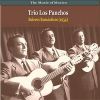 roster 31
Quarta-feira, 07/10/2015 - 15:52
roster 31
Quarta-feira, 07/10/2015 - 15:52
Hi Tom! you have done a good job.
Some of your words are new to me. Tell me: isn't 'buzz' just for words, gossip? In the two first verses I would have said "rumor/sound". And, in the fourth verse, if you say "timbrel" (?), the verse would fit in better.
For "cantar" en "El triste cantar", I would say, "melody".
But... you are the English master, not me.
You are right about the title, it refers to 'the group' but, there is another word for "comparsa", which is "el acompañamiento", and I think that's the word you should use in your translation: "el grupo" doesn't imply anything musical.



 michealt
michealt
Son cubano. Composición de Ernesto Lecuona.
Versión de Plácido Domingo
www.youtube.com/watch?v=xYrs1vAN0Ss
Esta pieza, aunque bien cantada por diferentes artistas, es, en realidad, una pieza para piano. Version de Thomas Tirino (se recomienda).
www.youtube.com/watch?v=1gUI85nhO7A